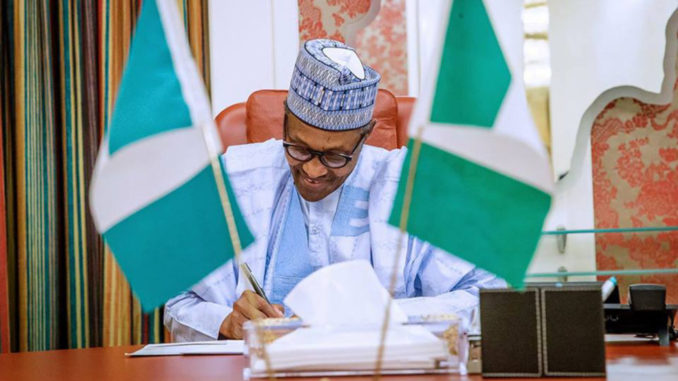
FROM sluggish growth, falling reserves and mounting debts to unmet revenue targets, capital flight and a jobless army of youths, the economy continues to confound President Muhammadu Buhari’s administration. News of a deceleration in Gross Domestic Product growth in the second quarter of 2019 followed on that of a dip to a five-month low in foreign reserves to $43.67 billion by August end, while the number of the unemployed skirted 21 million. Avoiding a more painful recession than the one the country climbed out from in 2017 needs a stronger response than the serial missteps of the government.
By universal consensus, Buhari’s first term and the almost four months since his second began have been wasted while his befuddlement and missteps tipped the precarious economy he inherited into recession and failed to reboot it after a tentative escape from the mire. The country’s situation today is in desperate straits, headlined by adverse domestic indices and tumult in the global economy; the times require a drastic change in the somnolence of the past four years and coordinated, job-creating and production-boosting reforms implemented in full sail.
Buhari needs to wake up. Amid mixed feelings, some optimists hope that his recent replacement of the Economic Management Team headed by Vice-President Yemi Osinbajo with an eight-member Economic Advisory Council of economists signals a determination to jolt the economy into a more productive mode. Such a kick is needed and urgently too.
To start with, GDP growth in Q2 this year barely moved at a disappointing 1.94 per cent, according to the National Bureau of Statistics, much less than the 3.3 per cent the government had expected. Foreign reserves, despite modestly higher oil prices than the bearish 2015-2016, are slipping, depleted by the constant draw downs to defend the naira, to stand at $43.67 billion, down from $45.19 billion in June this year. External debts, put at $25.6 billion by end of Q1, may actually be in the region of $30 billion by some estimates, while the Brookings Institution estimates that debt servicing drained 50 per cent of government’s revenues in 2018.
Two recent moves reflect the pressure on officials to find more money – the controversial query by the President’s chief of staff to the chairman of the Federal Inland Revenue Service to explain revenue shortfalls and the decision to raise value added tax by 50 per cent. American philanthropist, Bill Gates, underscored our predicament, pointing out that at six per cent of GDP, domestic revenue earnings were among the lowest globally, noting that, without significant improvement, it would be difficult to fund infrastructure, health care, education and other basic services.
Moving forward, Buhari should liberalise the environment, reach for some quick wins, then identify and furiously drive policies in critical sectors. Holding on to state-owned enterprises will never create jobs. But for sheer obduracy, the futility of holding on to idle, loss-making refineries, airports and seaports, the Ajaokuta Steel and subsidiaries of the Nigerian National Petroleum Corporation is becoming more glaring by the day; N2.95 trillion was spent on refined petroleum imports in 2018, says the NBS, while the NNPC claimed N843.12 billion as “under-recoveries” (read subsidy) in a mere 13 months and the Senate estimates that N11 trillion had been spent on subsidising petrol imports in the last six years.
Just as the liberalisation of the telecoms sector brought in massive foreign direct investment and created thousands of new jobs here, investment in Britain’s rail sector post-privatisation, rose nine-fold, reaching £6.84 billion in 2013-14. Buhari should also target the power, security, job creation, infrastructure, agriculture, mining and SMEs. The power sector, a major binding constraint, needs serious attention as the economy cannot soar without adequate regular power. An assessment of the transformative policies that created the Asian Tigers by a Citigroup researcher includes a stable business environment and improving the ease of doing business, investment in infrastructure, education and skills, increasing and diversifying exports, attracting massive FDI and promoting SMEs and start-ups.
An economy that is not creating jobs is at risk. Behind India’s rapid industrial breakthrough and an employment boost were policies to promote small businesses, infrastructure investment, opening up its once closed economy to investments and maintaining sound macroeconomic indices. As president, Lula da Silva’s strategy of striking a balance between social reforms with economic growth, and lowering inflation generated jobs, boosted exports and foreign investments and lifted 20 million Brazilians out of poverty.
Instead of ever more loans from China – the latest lunge being a $5.2 billion credit for the Ibadan-Kano rail line – Nigeria should seek to open the railway sector, as well as airports and seaports to investors. Buhari should heed warnings by the International Monetary Fund to curb the appetite for debt and rectify government’s fiscal deficiencies. Plans long held in abeyance by the President’s statist preferences to concession airports should be revived and implemented transparently with the single-minded objective of attracting the world’s most credible operators and creating jobs.
The government should secure the country as crime and lawlessness have reached alarming proportions. Apart from the economic policies, Buhari should take charge and fulfil the preeminent duty of a government to guarantee the safety of lives and property and make Nigeria secure for production and investment.
END

Be the first to comment